IMICS Thesis Workshop Empowers Students with Expert Guidance and Tools for Academic Success
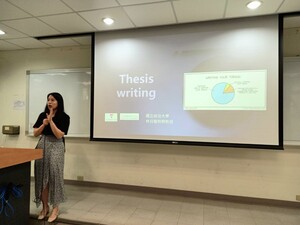
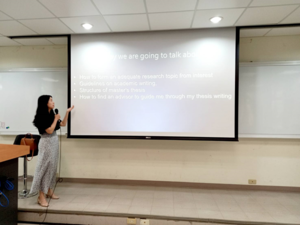
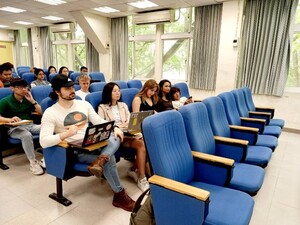
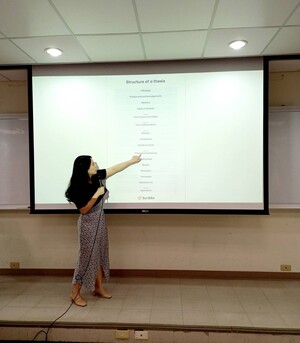
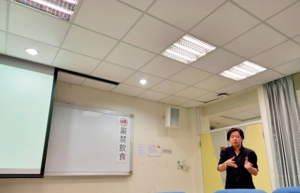
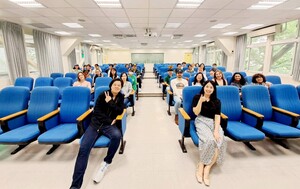
Date :
2024-04-01
Department :
International Master's Program in International Communication Studies
【Article by IMICS】
The International Master's Program in International Communication Studies (IMICS) at National Chengchi University (NCCU) hosted a thesis workshop on March 22nd, led by Dr. Jih-Hsuan Lin, the program's director and a distinguished professor. This workshop aimed to guide students through the daunting process of initiating their theses and seeking appropriate advisors. Notably, attendees included Dr. Meng-Chieh Yang and her students from the Digital Content Marketing in Social Media course, enriching the discussion with diverse perspectives.
Dr. Lin commenced the workshop by addressing common challenges faced by graduate students, particularly those in their first year, emphasizing the initial hurdles of thesis initiation. “The first step is always the hardest,” she remarked while illustrating the thesis-writing process with a meme underscoring the importance of thoughtful consideration – thinking about how to write a thesis always takes much of the time. She highlighted a prevalent mistake among students – conceptualizing overly broad topics – advising instead to refine topics using specific key terms. During the session, Hailey, one of the IMICS students, shared her ongoing thesis about analyzing the portrayals of Southeast Asian migrant workers in two Taiwanese newspapers. This concrete example serves as an illustration of how refined and narrow the topic should be.
As Dr. Lin delved into the importance of conducting a literature review to contextualize research, another student, Syrus, recommended a valuable resource, Anna's Archive, for accessing scholarly materials. “This website is useful when students cannot get access to certain essays or journals,” he claimed. Dr. Lin stressed the essence of providing substantive arguments in the literature review, cautioning against mere citation without critical engagement with sources. “Many students had simply quoted and cited from authors without bringing up the idea or why he or she cited from the references,” she explicated, from her past experiences in instructing and advising students. Additionally, practical tools like Excel, EndNote, and Zotero were suggested for efficient literature management. Dr. Yang also expressed her particular fondness for Zotero, citing its functionality as a plug-in and its ability for online synchronization, distinguishing it significantly from other software options.
Regarding theoretical frameworks, aside from drawing a diagram, Dr. Lin also advised limiting the adoption to one or two theories. “Utilizing only one theory is much better because there is often a clash between two theories,” she shared this particular tip from her thesis advisor in a humorous tone. As for the contribution part, Dr. Lin explained her viewpoint on why it is better to conclude with positive statements rather than focusing on flaws or limitations. “It is always better to end strongly,” she elucidated.
For the part of advising how to find a thesis advisor, reflecting on her experience at the University of Texas at Austin, Dr. Meng-Chieh Yang emphasized the significance of choosing an advisor who is often on-campus for fruitful discussions. Dr. Jih-Hsuan Lin further gave out more advice, including enrolling in courses taught by potential advisors. “This is helpful for getting to know each other. You get to realize the professor's style of doing things, and in turn, the professor gets to know you.”
In the concluding remark, Dr. Lin gave some more useful advices for writing your own thesis. These are listed as follows.
✓ DOs
• Keep an outline: Outlining your thesis is useful for discussing with your advisor. The reason lies in that it is much harder to adjust and modify your thesis if the paragraphs have been concretely written down.
• Two-week rule: Please do allow your thesis advisor and the committees of oral defense to read for at least two weeks. While this suggests a polite manner, this also points out the importance of time management.
• Be honest: If there are specific conditions, like rushing to graduate, you will have to spell this all out when finding a thesis advisor. As professors tend to work in a slow and steady pace, this is important for finding an advisor that is willing to guide you through the rushed process.
Collectively, this workshop provided invaluable guidance for IMICS students embarking on their thesis journey, equipping them with essential tools and insights for academic success.
The International Master's Program in International Communication Studies (IMICS) at National Chengchi University (NCCU) hosted a thesis workshop on March 22nd, led by Dr. Jih-Hsuan Lin, the program's director and a distinguished professor. This workshop aimed to guide students through the daunting process of initiating their theses and seeking appropriate advisors. Notably, attendees included Dr. Meng-Chieh Yang and her students from the Digital Content Marketing in Social Media course, enriching the discussion with diverse perspectives.
Dr. Lin commenced the workshop by addressing common challenges faced by graduate students, particularly those in their first year, emphasizing the initial hurdles of thesis initiation. “The first step is always the hardest,” she remarked while illustrating the thesis-writing process with a meme underscoring the importance of thoughtful consideration – thinking about how to write a thesis always takes much of the time. She highlighted a prevalent mistake among students – conceptualizing overly broad topics – advising instead to refine topics using specific key terms. During the session, Hailey, one of the IMICS students, shared her ongoing thesis about analyzing the portrayals of Southeast Asian migrant workers in two Taiwanese newspapers. This concrete example serves as an illustration of how refined and narrow the topic should be.
As Dr. Lin delved into the importance of conducting a literature review to contextualize research, another student, Syrus, recommended a valuable resource, Anna's Archive, for accessing scholarly materials. “This website is useful when students cannot get access to certain essays or journals,” he claimed. Dr. Lin stressed the essence of providing substantive arguments in the literature review, cautioning against mere citation without critical engagement with sources. “Many students had simply quoted and cited from authors without bringing up the idea or why he or she cited from the references,” she explicated, from her past experiences in instructing and advising students. Additionally, practical tools like Excel, EndNote, and Zotero were suggested for efficient literature management. Dr. Yang also expressed her particular fondness for Zotero, citing its functionality as a plug-in and its ability for online synchronization, distinguishing it significantly from other software options.
Regarding theoretical frameworks, aside from drawing a diagram, Dr. Lin also advised limiting the adoption to one or two theories. “Utilizing only one theory is much better because there is often a clash between two theories,” she shared this particular tip from her thesis advisor in a humorous tone. As for the contribution part, Dr. Lin explained her viewpoint on why it is better to conclude with positive statements rather than focusing on flaws or limitations. “It is always better to end strongly,” she elucidated.
For the part of advising how to find a thesis advisor, reflecting on her experience at the University of Texas at Austin, Dr. Meng-Chieh Yang emphasized the significance of choosing an advisor who is often on-campus for fruitful discussions. Dr. Jih-Hsuan Lin further gave out more advice, including enrolling in courses taught by potential advisors. “This is helpful for getting to know each other. You get to realize the professor's style of doing things, and in turn, the professor gets to know you.”
In the concluding remark, Dr. Lin gave some more useful advices for writing your own thesis. These are listed as follows.
✓ DOs
• Keep an outline: Outlining your thesis is useful for discussing with your advisor. The reason lies in that it is much harder to adjust and modify your thesis if the paragraphs have been concretely written down.
• Two-week rule: Please do allow your thesis advisor and the committees of oral defense to read for at least two weeks. While this suggests a polite manner, this also points out the importance of time management.
• Be honest: If there are specific conditions, like rushing to graduate, you will have to spell this all out when finding a thesis advisor. As professors tend to work in a slow and steady pace, this is important for finding an advisor that is willing to guide you through the rushed process.
Collectively, this workshop provided invaluable guidance for IMICS students embarking on their thesis journey, equipping them with essential tools and insights for academic success.


 Fax:886-2-29379611
Fax:886-2-29379611